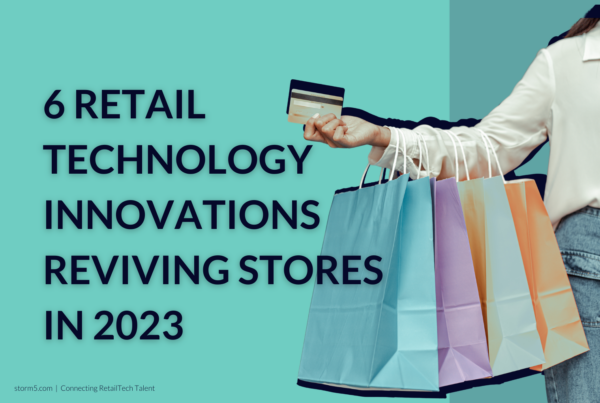How Mobile POS Fits in Your Retail Tech Strategy
The in-store experience is truly being redefined as new technology drives the point-of-sale (POS) evolution. Just a decade ago, the mobile environment allowed brick-and-mortar retailers…

The in-store experience is truly being redefined as new technology drives the point-of-sale (POS) evolution.
Just a decade ago, the mobile environment allowed brick-and-mortar retailers to authorise transactions from anywhere in the store, causing many to believe the demise of the register was near. The traditional POS system is not necessarily going away any time soon, however, as new technology drives the evolution of the POS, it is the store experience for both the shopper and the retailer that is truly being reimagined.
With instant access to almost any data source within their business, retailers can make better, more educated decisions in real time despite the modern hyper-connected consumer. This is key as these developments have significantly raised the expectations of today’s savvy, smartphone-powered consumer.
These advancements showcase the rise of the “Mobile 2.0” retail economy.
Mobile technology and devices, which were once thought of as functional add-ons for retail management systems, have now turned into crucial components of 21st-century retail and are no longer capable of functioning in technical silos.
A mobile POS (mPOS) system will not only provide you with the agility required to participate in retail mobilization, but it will also provide you with several benefits that you will be able to reap almost immediately after implementation. An mPOS system broadens your brand’s reach by performing advanced business management tasks and opening up new channels for customer attraction and engagement.
This article will discuss how mobile POS can advance your retail technology strategy and help SMBs understand important factors to consider when making an investment.
What Is A Mobile POS System?
A mobile POS system (mPOS) is a portable hardware and software system that processes sales. An mPOS is similar to a traditional POS system, except that it is not limited to a single checkout counter.
With a mobile POS system, you can install POS software onto a tablet or smartphone and serve customers wherever they are. Your checkout moves to wherever you need it, so your store doesn’t even need a checkout counter.
Building Your Strategy
Technology is enabling a more seamless experience in retail, however, without simultaneously shifting culture and processes, you could fail to see a full return on investment. To achieve the best results, retailers should develop a comprehensive strategy that includes factors like technology, store operations and staff training.
Knowing where to begin can be the most difficult challenge for retailers considering mobile POS to support new or changing strategies. To get started, retailers should think about their store operations, the retail hardware they choose, and how the policies they put in place will be affected by the transition to mobile. Here are three mobile POS features that will help your retail business be more flexible:
1. Mobility
All retailers value technologies that are affordable and easy to implement. The fact that mobile POS gives you POS mobility might seem obvious, but have you actually considered what it might entail for your company? Sales representatives are no longer required to work behind the cash desk. They can carry a mobile or tablet device with them to assist customers in the aisles and close sales at the right point of decision. It also frees up floor space by using fewer POS terminals and allows you to expand your retail tech strategy to manage business almost anywhere.
2. Real-time Access to Customer Data
Customers appreciate and, often, anticipate a personalised shopping experience. Your employees can use mobile POS to access previous purchases, browsing history, loyalty rewards totals, and other data that can help them engage the customer and make relevant upsell or cross-sell offers. Performance can improve if your team is aware of the brands that customers prefer. Mobile POS is beneficial because it allows them to obtain the information they require to increase sales. With the help of this precise, highly visual information, your salespeople can create shopping experiences that are unique to each consumer, making conversational selling easier.
3. Inventory Management
Aside from checkout features, mobile POS makes it easier for your employees to access information while serving customers. A salesperson will not have to leave the customer to check the inventory in the stock room because a few touches on a tablet’s touchscreen provides quick access to the answer.
Furthermore, if the product is not currently in stock at the store, the salesperson can locate it and have it shipped to the customer or the store, potentially saving the transaction. A mobile POS with a barcode scanner provides a quick and precise count. Your inventory management system automatically receives data, giving you an exact count in real-time without the need for data entry or synchronisation.
Key Considerations For Mobile POS
There are inevitable operational issues and opportunities to consider, from how your employees use technology in-store to what your customers expect. Your mobile POS preferences will be influenced by a number of factors:
Functionality: Your POS decision-making process will be influenced by how business is conducted in your store(s). Think about how your consumers pay—do they typically use cash, or do they always swipe a card? What kinds of transactions will employees be responsible for?
Form: Smartphone or tablet? Certain gadgets can perform better than others depending on the task at hand. While a tablet has a larger screen and can help with back-office tasks and sales collaboration, a smaller device may be more useful for switching between tasks or quickly scanning objects for pricing checks.
User Experience: It is essential for a frictionless process that the application interface is consistent from platform to platform, whether from traditional registration to mobile, iOS to Android, or any other format. This consistency facilitates user acceptance.
Finding What’s Right For Your Brand
Mobile POS is becoming increasingly important for many businesses in terms of improving the customer experience and elevating their retail technology strategy. Customers shop in-store for two main reasons. They need urgent information or items, as well as a fast checkout. Mobile POS meets both of these requirements. Setting up your retail business for the future with mobile POS makes sense for a variety of reasons, including on-the-go selling, queuing reduction, and improving the overall service quality. As a result, having a mobile-first strategy is key. Otherwise, you risk losing customers to competitors.
Just as each retailer is unique, so are each brand’s operational and technological requirements. While there is no one-size-fits-all solution, considering the factors listed in this article will help you narrow your search and create a must-have list for your mobile POS.
Here at Storm5, we work with startups and scaleups in RetailTech wanting to revolutionise the shopping experience and customer journeys. Regardless of the stage of funding you’re currently in, and which sector you’re operating in, we can help you with your hiring needs. As leaders in Retail POS recruitment, we take pride in working with the best talent on the market. Don’t hesitate to get in touch in case you’re looking for a growth partner to help you transform the in-store purchasing experience!








